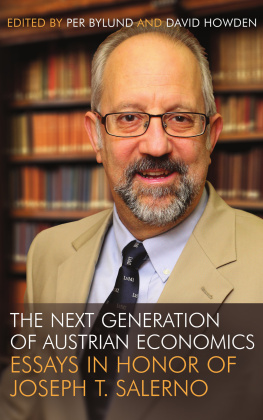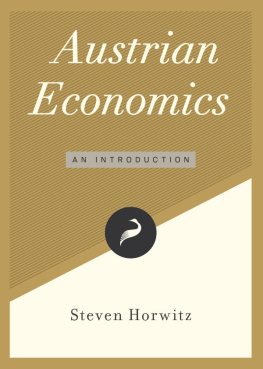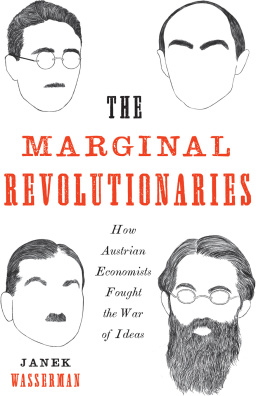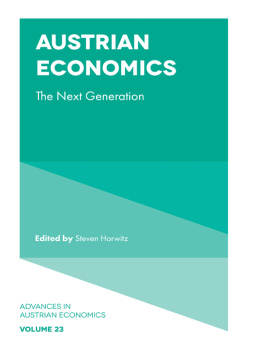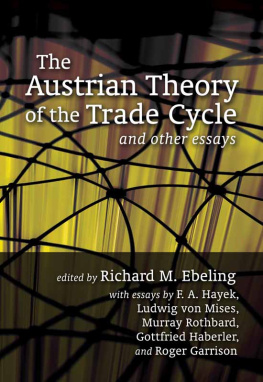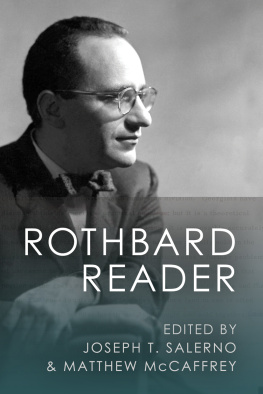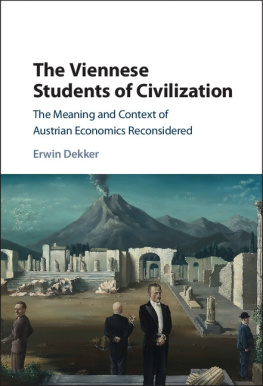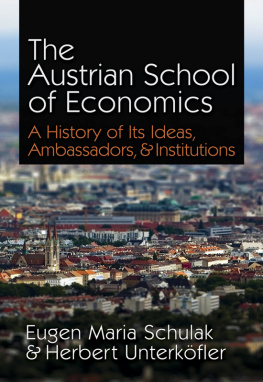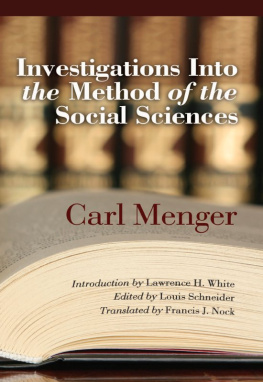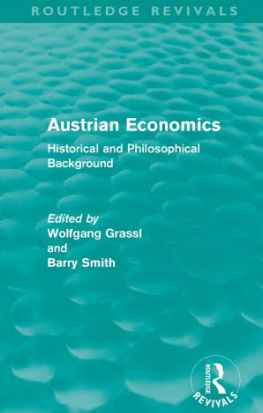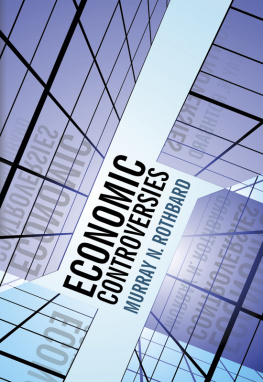Foreword
Llewellyn H. Rockwell, Jr.*
A fter Joey Rothbards death, I flew to New York to organize the disposal of Murray and Joeys goods according to their wills. Books and papers went to the Mises Institute, of course, where they are the center of our library and archives. But my strongest memory, aside from ineffable sadness, was the printed document on the small table next to Murrays reading chair in the living room. It was Joe Salernos doctoral dissertation.
To me, that has always symbolized Murrays relationship with Joe, whom he praised as a wonderful economist, and perhaps almost as important in our times as a brave fighter against error and sellout.
Joe has been a strong intellectual influence on the Mises Institute since our founding. How appropriate that he is also Murrays successor as our academic vice president.
Joe influences so much. The Mises University, the Austrian Economics Research Conference, and the Summer Fellows Program are all under his aegis, and much the better for it. Not only is Joe an important scholar, he is a teacher of the sort we would all have loved to have had. No one could be more patient, rigorous, detailed, and loving. Forget Mr. Chips. Weve got Joe Salerno.
* Llewellyn H. Rockwell, Jr. is chairman and CEO of the Mises Institute, Auburn, Alabama.
Published 2015 by the Mises Institute. This work is licensed under a Creative Commons Attribution-NonCommercial-NoDerivs 4.0 International License.
http://creativecommons.org/licenses/by-nc-nd/4.0/
Mises Institute
518 West Magnolia Avenue
Auburn, Alabama 36832
mises.org
ISBN: 978-1-61016-593-8
eISBN: 978-1-61016-636-2

Mises Institute , founded in 1982, is a teaching and research center for the study of Austrian economics, libertarian and classical liberal political theory, and peaceful international relations. In support of the school of thought represented by Ludwig von Mises, Murray N. Rothbard, Henry Hazlitt, and F.A. Hayek, we publish books and journals, sponsor student and professional conferences, and provide online education. Mises.org is a vast resource of free material for anyone in the world interested in these ideas. For we seek a radical shift in the intellectual climate, away from statism and toward a private property order.
For more information, see , or phone us at 1.800.OF.MISES.
Mises Institute
518 West Magnolia Avenue
Auburn, Alabama 36832
Introduction
Per Bylund and David Howden
T en years ago Joe Salerno inherited the Mises Institutes summer fellowship program from his predecessor, Jrg Guido Hlsmann. Generously funded by Peg Rowley, summer fellows are given time to study Austrian economics firsthand with some of the current masters. Not only is a sense of camaraderie inculcated amongst the participants, but they are also given access to the worlds best Austrian economics library and other resources. Frequent visits by friends of the Institute give these young scholars the ability to ask questions about the theory and history of the movement, and give them an ability to become a part of its ongoing evolution.
Central to this fellowship is the mentorship of Professor Salerno himself. Under his stewardship the program has brought 138 students to the Institutes facility in Auburn, Alabama, from 2005 to 2013. These students have produced magnificent works central to Austrian economics during their summers in Auburn, and have gone on to take active roles in both the academic community and with private industry.
Perhaps more important than the careers that these young scholars have gone on to live is the enlightenment that they have shared with others through their daily lives. Using their argumentation skills fomented during their stays at the Mises Institute, these scholars have had their reach extended to others in subsequent encounters. We are all the better off for it.
The contributors to the present volume come from the ranks of PhD students, post-doctoral researchers and university professors. They have reached out to others in a bid to have the truth of their studies heard by the widest audience possible. Professor Salernos work in fostering debate and encouraging students during their summer in Auburn has no doubt been influential in spurring on this activism.
The present book is divided into three sections: money, policy and what we can refer to as mundane economics, the study of the basic, yet vital topics of the science. Each section represents an important area of Professor Salernos own research and his imprint on each chapter should be apparent to the reader. Suffice to say, a brief overview of his contributions will assist the reader in seeing his impact on the development of these young Austrian scholars in particular, and on Austrian economics in general.
Influence on Mundane Economics
Professor Salerno is one of the leading contemporary theorists in the Austrian tradition. A former colleague of Murray Rothbards, Professor Salerno has made his unfading mark on the theoretical Austrian literature through several influential as well as highly provocative articles. He has also changed the landscape for Austrian theorizing and the self-perception of Austrians.
His perhaps most debated contribution is Mises and Hayek Dehomogenized (1993), an article that essentially rewrote the history and sociology of the Austrian school. Professor Salerno here argues that the Mengerian tradition was developed in very different directions by his brilliant followers, Eugen von Bhm-Bawerk and Friedrich von Wieser, and by their own students and followers (1993, p. 114). In fact, Professor Salerno argues, these directions constitute very different paradigms. The former focuses on monetary calculation and resource allocation using actual market prices and comprises the social rationalism of Mises (Salerno 1990) and the judgmental entrepreneur (Salerno 2008b); one may also add the distinctly Austrian method of praxeology (see e.g., Rothbard 1951a; 1951b). The latter, in contrast, is a general equilibrium tradition (Salerno 2002) focused on the problem of coordination due to dispersed and tacit knowledge (see Hayek 1937; 1945) and much more inclined to quantitative analyses.
While only one of many influential contributions, the dehomogenized article represents Professor Salernos contributions to Austrian theory well. His contributions to mundane theory are primarily in the form of integrating existing theories and prospective theoretical perspectives by offering reinterpreting and contextualizing commentary, comparisons, and theoretical extensions. While perhaps not as glamorous as producing thousand-page treatises, this important integrative work is what produces a consistent body of theory that defines and furthers a tradition or school of thought.
Salernos work has strengthened the Austrian theoretical tradition and helped identify precursors and proto-Austrians. His work stretches beyond publishing in specifically Austrian journals and discussing exclusively Austrian theorists. Much thanks to Professor Salernos work, we are able to trace the philosophical origins of Austrian thought centuries if not millennia back in time and can identify kinship with other traditions. To exemplify, Professor Salerno has pursued illuminating commentary on the legacies of Carl Menger (Salerno 2004; 2010a), Eugen von Bhm-Bawerk (Salerno 2008), Ludwig von Mises (Salerno 1995a; 1999; 2012), Murray N. Rothbard (Salerno 2006), as well as of the French Liberal schools Jean-Baptiste Say and Frdric Bastiat (Salerno 1978; 1985; 1988; 1998; 2001), and has addressed the theoretical origins and shortcomings of opponents and competing traditions (Salerno 1992). Professor Salerno has also addressed traditions in monetary theory (Salerno 1991), but this work has come to be overshadowed by his important theoretical advances related to macroeconomics and money, especially monetary policy, business cycle theory (Salerno 1989; 2012b), and the calculation problem (Salerno 1990b; 1994b; 1996a).

